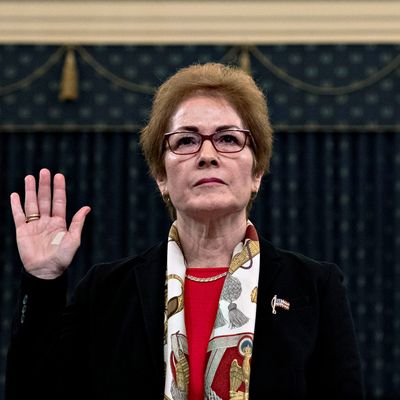
There are no standing ovations in diplomacy. That’s not how it works.
Your best written lines are delivered by someone else; your best policy ideas are delivered to political appointees. You wait for instructions that are usually disappointing and funding that is invariably insufficient.
You stay up all night working on the peace deal, only to learn that overnight a militia fired a shell into a crowded market, or your own president changed his mind about supporting the deal. You walk back into the room with your adversaries, nod, and keep going.
If you are a woman, sometimes your biggest obstacles are your own colleagues; you are only two-thirds as likely to be promoted to senior ranks as a man. If you report discrimination, harassment, or assault, you will frequently be told that you have put your own career at risk by speaking out.
When you come home, your fellow Americans are unsure of what you do. You don’t qualify for the discounts and recognition accorded military veterans, though you too sacrificed predictability and personal freedom in the national interest, and you too remember colleagues who gave their lives in Benghazi and Bosnia and Afghanistan. You may be mocked and stereotyped as a member of a “striped-pants” elite, even if you were the child of immigrant parents or were frequently mistaken for the secretary on your postings.
But, it turns out, in the fight to save American democracy from amoral kleptocrats and their cynical GOP enablers, there are standing ovations. And at the end of her testimony Friday, Ambassador Maria “Masha” Yovanovitch received one from the citizens who had filled the House hearing room to spend a sunny Friday hearing about what it is like to have your boss, the president of the United States, criticize your job performance with lines cribbed from second-rate Mafia flicks.
Yovanovitch used her time in the spotlight to give a passionate defense of the sometimes bloodless work of a federal employee. She spoke for the public servants who are the lifeblood of our government, and who believe, against all odds, in the power of an apolitical civil service — something like the way New Yorkers believe in their terrible football teams.
As the president — her boss — tweeted out a critique of her career in real time, she spoke for the millions — immigrants, religious minorities, LGBTQ, people with disabilities or reliant on Obamacare — to whom the president’s tweets are not just crass but put at risk their livelihoods, or even their lives.
And as women in the foreign-policy community braced for a hearing that seemed to have been designed to contrast the manly virtues of Ambassador William Taylor and bowtie-wearing George Kent with a fearful, ashen-faced Yovanovitch, she spoke for everyone who knows that you can shake and turn pale on the outside but remain what retired ambassador Nancy McEldowney called “a towering figure of integrity [and] inner strength.”
But as all three State Department hands reminded their questioners over and over, the job of the diplomat is to negotiate, observe, report, and implement. It is not the job of diplomats — or any civil servants — to assess the criminal intent of their boss. It is not the job of civil servants — or the military — to be the keepers of civic virtue when political leaders cannot bring themselves to value country over party.
Masha Yovanovitch cannot save American democracy. Just as former Defense Secretary James Mattis cannot save it, anonymous authors cannot save it, and the “adults in the room” cannot save it. As diplomats might tell us from careers in places where societies have fallen apart in the most catastrophic ways imaginable, political leadership is the way in — and leadership, from politicians, but also from people in every walk of life — is the only way out.
Diplomats can, if we would listen, tell us how citizens in other countries that have faced political gridlock, authoritarian corruption, and the menace of political violence have saved their own societies. They would remind us of the people of Tuzla, who valued their city over their sectarian identities and kept peace while the Bosnian civil war raged around them. They would share the story of Rwandan Muslims who told attackers, “there are no Tutsi or Hutu here,” even at the cost of their own lives. They might share pointers of how truth and reconciliation processes succeeded, or failed, to bring victims a measure of justice and communities a measure of normalcy. They would have a great deal to say about how to prepare for an election campaign when one party is trumpeting inflammatory, hateful rhetoric.
They would warn us that there are no quick fixes — and that righteousness is no substitute for resilience, for the willingness to listen, and the courage to speak up.
Would we give a standing ovation for that?





























